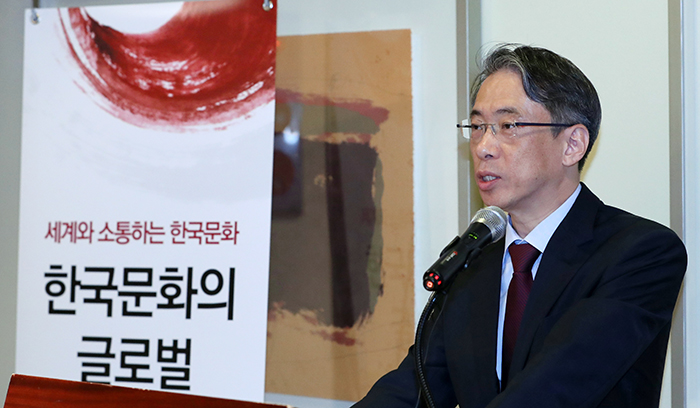
Director Kim Tae-hoon of the Korean Culture and Information Service (KOCIS) briefs the press on his organization's four-year action plan for the spread of Korean arts and culture overseas. (Jeon Han)
By Lee Hana
Seoul | April 30, 2018
Korean arts and culture will soon become more accessible across ASEAN and in countries neighboring Russia. Meanwhile, an entire year of cultural exchange programs will unfold in the Philippines in 2019, to mark 70 years of diplomatic relations with Korea. The same will happen in Malaysia in 2020, to celebrate the 60th anniversary, and in Vietnam in 2022, to mark the 30th.
The Korean Culture and Information Service (KOCIS), in charge of running 32 Korean cultural centers in 27 countries, announced these details and more during a press briefing in Seoul on April 30, upon finalizing its "Strategies for the Globalization of Korean Arts and Culture." It is a four-year action plan that outlines 10 projects to be carried out between 2018 and 2022.
First, the cultural centers will focus on expanding their reach across ASEAN and the Commonwealth of Independent States (CIS), where Korean arts and culture isn't as widely known as in countries like Japan, China, the U.S. or in Western Europe. In ASEAN, the Indonesian cultural center will be transformed into a Korean Center, while Malaysia will also get a cultural center of its own.
In the CIS, KOCIS will expand its cultural programs to transform the Russian and Kazakhstani cultural centers into full-on Korean culture hubs. Meanwhile in 2020, KOCIS will organize a year of cultural exchanges between Korea and Russia in celebration of 30 years of diplomatic ties.
More Korean language classes will be available, as well. The King Sejong Institute Foundation will increase the number of students from 60,000 to 90,000 by 2022. It will also send more Korean language educators to its overseas institutes, and expand the Sejong Culture Academy from 15 locations to 50 by the year 2022. The Nuri-King Sejong Institute, an online learning platform, will offer a much broader range of educational materials in terms of video and for mobile devices for its students, too.
Finally, overseas cultural centers that are currently in leased buildings will move into Korea Centers, locations that will house a King Sejong Institute, offices for the Korean Tourism Organization, and the Korea Creative Content Agency, for complete one-stop service.
"The promotion of Korean arts and culture overseas is a task that we have to spearhead, with the goal of improving our national brand. KOCIS, along with 10 other related organizations and a panel of experts, put our heads together to come up with this four-year action plan," said KOCIS Director Kim Tae-hoon.
"We will continue to cooperate closely with all our partners to ensure that our arts and culture expands its reach to all corners of the world, thus increasing the soft power of Korea abroad," he said.
hlee10@korea.kr
Most popular
- Korea.net welcomes 2025 K-influencers, Honorary Reporters
- 2025 Honorary Reporter class pledges to spread 'real Korea' worldwide
- US urged to exempt tariffs on Korea in first '2+2' trade talks
- Korean culture festival in Cuba marks 1st year of bilateral ties
- Slew of festivals, events scheduled in downtown Seoul in May
